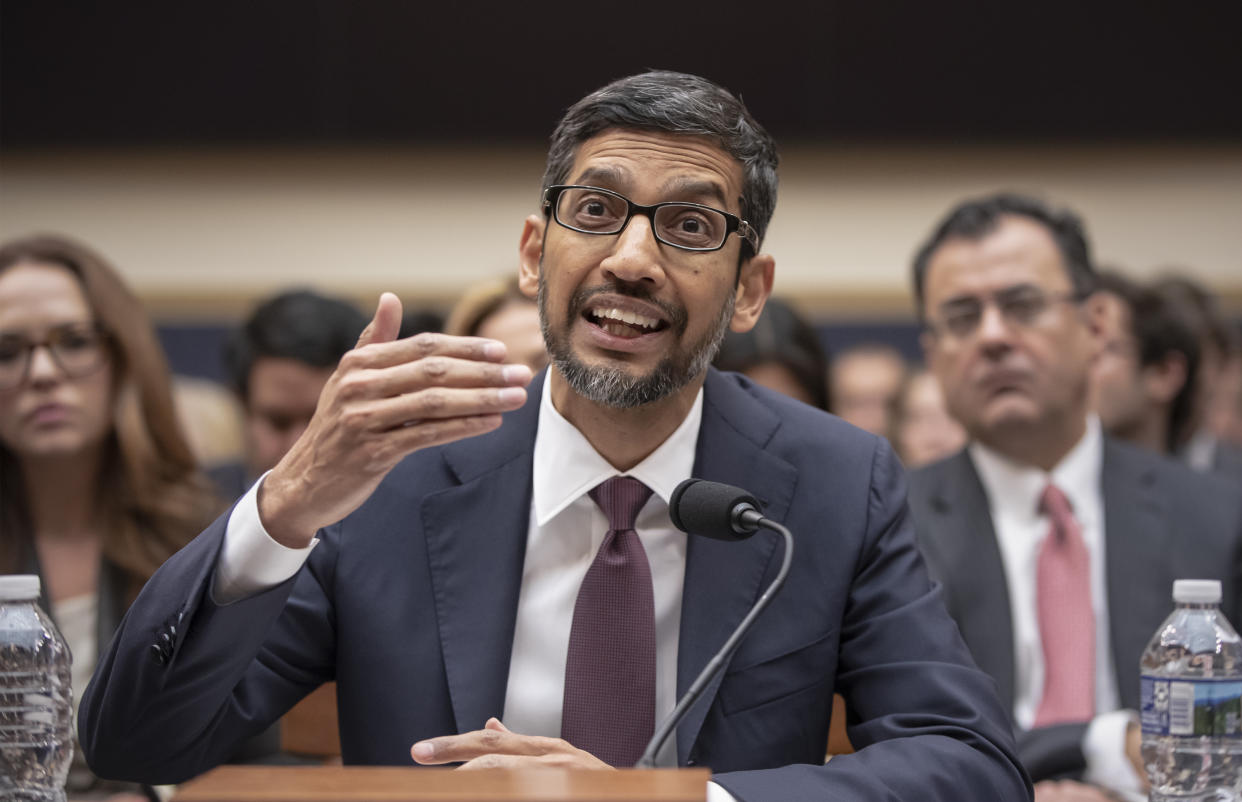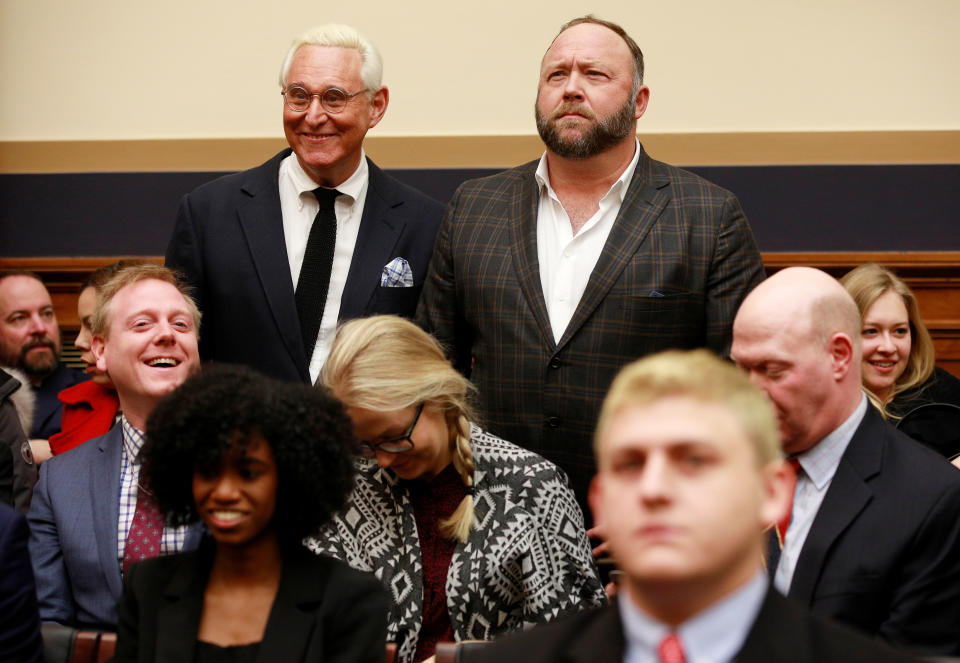Google chief faces lawmakers concerned with Silicon Valley, but often puzzled by technology

WASHINGTON — Two things were clear from Tuesday’s testimony of Sundar Pichai, the chief executive of Google’s parent company, Alphabet Inc.: Everyone is unhappy with Silicon Valley, though everyone is unhappy for different reasons.
Pichai was called to testify by Republicans on the House Judiciary Committee, who believe that conservative outlets and views are suppressed by Google’s search engine. But they lacked concrete evidence of wrongdoing, and some of their grievances betrayed a naiveté about the particulars of how technology works.
Democrats defended Google against political bias, while leveling charges of their own, whether about not fostering enough diversity or allegedly working too closely with China. But they too failed to show the kind of fluency that may have put Pichai on the defensive.
“Almost every question has a misunderstanding embedded in it,” tweeted Nicholas Thompson, editor of technology magazine Wired. “It’s making my head explode.” An even more scathing review came from Mike Cernovich, a conservative journalist who has been critical of Silicon Valley. “The hearings were an embarrassment,” he wrote in an email. “It’s clear members of Congress do not understand the Internet in any significant let alone nuanced way.”
At one point, Steve King, R-Iowa, complained about an inappropriate image or message pertaining to himself that supposedly appeared on his granddaughter’s iPhone while she was playing a game.
“Congressman, iPhone is made by a different company,” Pichai answered patiently, promising as he did many times throughout the afternoon to “follow up,” a telling sign that he’d been well-coached by Alphabet’s government-relations staff.
The exchange with King was indicative of Pichai’s general approach. He withstood a barrage of attacks on his company, which has come to represent both the promise and peril of digital technology. His four-hour turn on Capitol Hill only served to confirm that Google is an enormous corporation working in a complex world. And though many of its services are free, they are hardly without cost: Google makes 84 percent of its revenue from advertising, which it is able to sell in such enormously high volume because it knows so much about the people who use its products. Several times during the hearing, members of Congress struggled with the fundamental, if also uncomfortable, fact that personal data is the currency of the Internet. That sometimes put Pichai in the role of a professor in a not particularly auspicious section of an introduction to digital technology college course.
Which isn’t to say that he left the Hill unscathed. One of the most spirited attacks on the 46-year-old engineer-turned-executive came from Rep. Jim Jordan, R-Ohio, who insinuated that Google employees had conducted a “get-out-the-vote” operation for Hillary Clinton during the 2016 presidential election. Pichai sought to differentiate between encouraging civic participation and corporate political activism. He also distanced himself from a specific employee who appeared to have been involved in pro-Clinton work.
“That would be against our principles,” Pichai said.

The explanation did not appear to satisfy Jordan, who is known to grow testy during congressional hearings.
Another tense exchange took place as Ted Poe, R-Texas, held up his iPhone and asked if, were he to move to sit next to a Democratic colleague, Google would know that he had moved his location (several of the legislators conflated Google with other corporations, which may have betrayed a genuine misunderstanding but could also be indicative of how closely the fortunes of companies like Facebook, Google and Apple are aligned). It was one of several questions directed at Google’s location tracking and data collection activities.
“Not by default, no,” Pichai answered. “There may be a Google service which you’ve opted into.”
Poe, like Jordan, did not appreciate the circumspect response. “It’s not a trick question,” he said, growing vehement. “You know, you make $100 million a year, you ought to be able to answer that question.” Later, Poe came close to endorsing General Data Protection Regulation, the new European online privacy policy. Silicon Valley has vigorously fought against similar measures, a sign that the concerns raised by Silicon Valley’s growth could lead to a political realignment on issues like privacy, free speech and workplace readiness.
“We always think there is more to do” on data collection, Pichai said in response to an earlier question from Hank Johnson, D-Ga. It was a practiced answer, one that did little to lessen bipartisan concern about the vast trove of information that is Google’s lifeblood. Indeed, privacy seemed as much a concern for legislators as political bias.
Given the disparate questions flung at Pichai, it was easy to forget that the hearing was nominally about political bias at Google: the bias of its employees and the consequent bias of its products. In the audience were provocateurs Alex Jones, the Infowars founder, and Roger Stone, the former Trump adviser. Both have been banned from some Internet platforms for apparent violations of terms of service, which has allowed Jones and Stone to cast themselves as victims of a prevailingly liberal industry.
Asked by Yahoo News in a hallway outside the congressional hearing about spreading conspiracy theories, including about the killing of 20 children at the Sandy Hook Elementary School in 2012, Jones denied responsibility, angrily confronted the Yahoo News reporter and claimed that Americans would stand up to Silicon Valley “in the third dimension.” It was not clear what he meant. Both men accused Google of censorship, though without providing convincing evidence to that effect.
“Google is evil,” Jones said, a reference to the company’s famous, now retired motto.
Although the committee’s chairman, Rep. Bob Goodlatte, R-Va., referenced accusations that Google “manipulates its algorithm” to de-emphasize conservative-leaning news outlets and organizations, there’s been no public evidence presented that the search giant skews results to reflect liberal proclivities.
As at least one Republican pointed out, Google is based in one of the most politically progressive regions of the United States. Leaked video, for example, showed Google’s leadership criticizing President-elect Trump shortly after the 2016 election.
Several months after the election, Google fired James Damore, a Google engineer who circulated a memorandum that called into question some of his peers’ convictions on ethnic and gender diversity. Damore quickly became a cause célèbre for conservatives. His lawyer Harmeet Dhillon, who watched the Pichai testimony from her San Francisco law office, told Yahoo News that she found the proceedings “risible.”
“Both parties were asking stupid questions,” added Dhillon, one of the few prominent conservative voices in California. “Really, it was embarrassing.”
Democrats sought to supplant Republicans’ agenda with their own. The committee’s ranking Democratic member, Jerrold Nadler of New York, dismissed the “delusions of the far right” and the “right-wing conspiracy theory” that had brought Pichai to Capitol Hill. Alphabet and its employees were collectively the top donor to Nadler’s recent reelection effort, with contributions totaling $26,458. In all, Google’s parent company made $6.3 million in political contributions during the 2018 cycle, the majority of it to Democrats. Some of those Democrats, including Zoe Lofgren and Ted Lieu, sit on the House Judiciary Committee.
Lieu defended Google by arguing that the complaint about “bias” often reflects the fact that Republicans, in his opinions, often justly attract negative press attention. He cited reporting on incendiary statements made by Rep. King of Iowa, who has been called a white nationalist and racist.
“If you want positive search results, do positive things. If you don’t want negative search results, don’t do negative things. If you are getting bad press articles and bad search results, don’t blame Google or Facebook or Twitter,” Lieu said. “Consider blaming yourself.”
That’s not to say that Pichai escaped all questioning from Democrats. Nadler wanted to know about Google’s unwitting participation in Russia’s efforts to flood the 2016 electoral process with disinformation and divisive rhetoric, in part by buying advertisements.
“We’ve learned a lot,” Pichai said, without explaining what he meant. He also said that Google is not working with China’s repressive government to build a heavily censored search engine, an initiative known as Project Dragonfly. Multiple news reports contradict that assertion.

At times, the hearing seemed to reflect a pervasive unease with how prevalent technology has become in people’s daily lives. Lofgren, who represents the district where Google is based, wanted to know about housing prices in San Jose. Sheila Jackson Lee, D-Texas, wondered if Google and YouTube, which it owns, could do more to promote diversity. Steve Cohen, D-Tenn., mused about an “online school” that would, presumably, have real Google employees answer questions about the company’s products. Pichai did not seem especially enthusiastic about the idea.
But despite such digressions, the hearing routinely returned to the notion that Google’s liberal employees wrote liberal code, which in turn effectively hid conservative sites like Breitbart. “They can deny it, of course,” said Dhillon, the conservative San Francisco lawyer. “They have to deny it, because it’s outrageous.”
At one point, Rep. Lofgren tried to help Pichai by asking why, when she’d Googled “idiot” a few moments before, an image of President Trump came up. The question was intended to allow Pichai to explain that Google results are refined by past Google searches, not by Google employees directing users to sites those employees favor.
“So it’s not some little man,” Lofgren wondered archly, “sitting behind the curtain figuring out what we’re going to show the user?”
Pichai agreed that there was no “little man.”
_____
Read more from Yahoo News:
Cohen is a ‘serial liar,’ says former Trump aide Lewandowski
Take a number: Migrants, blocked at the border, wait their turn to apply for asylum
An American killing: Why did the U.S. Park Police fatally shoot Bijan Ghaisar?
I called George Bush a ‘wimp’ on the cover of Newsweek. Why I was wrong.
Photos: 4th consecutive Saturday of anti-government protests in Paris




